unit8-9
初中英语(五四制)六年级下册Unit8——Unit9大单元教学设计
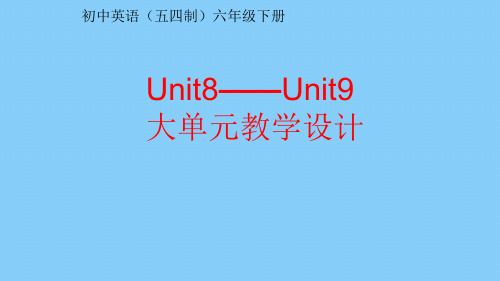
二、单元内容分析
三、单元教学目标
单元教学目标
语篇
1.通过听说练习,学生能够认识并积累关于社区的一些地点名词, Section A (1a-2d)
并在语境中正确使用there be句型。
听,说课 (1课时)
2.正确使用there be 句型,where be特殊疑问句以及指路问路等 Section A (Grammar
语法结构。
Focus-3c)
语法课(1课时)
3.更进一步学习在日常生活中如何得体地运用英语向别人指路问 路。
4.学生能够选择恰当的学习技巧完成阅读任务,对语篇内容进行 深入思考和分析。
5.学以致用,在日常生活中保证自身安全的情况下,敢于问路, 乐于指路。
Section B (1a-1e) 听说课(1课时)
在本单元的学习中, 要积极培养 同学们学习英语的兴趣,学会边 听边做笔记,捕捉关键信息,能 通过记忆和运用词块学习词汇。
二、单元内容分析
三、单元教学目标
单元教学目标
语篇
1.了解日常活动动作短语,在此基础上,学生可以进行简单的进行 Section A (1a-2d) 初步的口头语言输出,让学生通过听和说感悟现在进行时的使用 听,说课 (1课时) 语境及其用法。
Section B (1a-1e) 听说课(1课时)
Section B (2a-2c) 阅读课(1课时)
Section B (3a-3c) 写作课(1课时)
Unit 9 It’s raining.
单元主题:It’s raining. 该主题属于“人与自然”范畴,涉及天气状况及人们正在进行的活动。
一、 单元内容分析 本单元的中心话题是谈论天气,整个单元的内容围绕天气展开听、说、 读、写的活动,描述人们在不同天气所做的各种活动。
Unit 8 9 Expository Writing
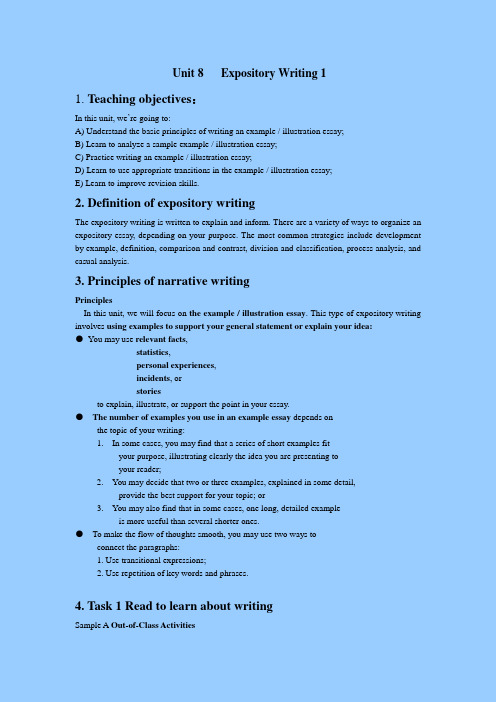
Unit 8 Expository Writing 11. Teaching objectives:In this unit, we’re going to:A) Understand the basic principles of writing an example / illustration essay;B) Learn to analyze a sample example / illustration essay;C) Practice writing an example / illustration essay;D) Learn to use appropriate transitions in the example / illustration essay;E) Learn to improve revision skills.2. Definition of expository writingThe expository writing is written to explain and inform. There are a variety of ways to organize an expository essay, depending on your purpose. The most common strategies include development by example, definition, comparison and contrast, division and classification, process analysis, and casual analysis.3. Principles of narrative writingPrinciplesIn this unit, we will focus on the example / illustration essay. This type of expository writing involves using examples to support your general statement or explain your idea:●You may use relevant facts,statistics,personal experiences,incidents, orstoriesto explain, illustrate, or support the point in your essay.●The number of examples you use in an example essay depends onthe topic of your writing:1.In some cases, you may find that a series of short examples fityour purpose, illustrating clearly the idea you are presenting toyour reader;2.You may decide that two or three examples, explained in some detail,provide the best support for your topic; or3.You may also find that in some cases, one long, detailed exampleis more useful than several shorter ones.●To make the flow of thoughts smooth, you may use two ways toconnect the paragraphs:1. Use transitional expressions;2. Use repetition of key words and phrases.4. Task 1 Read to learn about writingSample A Out-of-Class Activities1)Sample ARead the followi ng essay about college students’ out-of-class activities, and●find the thesis statement, four examples and the conclusion;●pay attention to how the writer uses the four examples to support a point;●study the structural elements that hold the essay together.2)Learn the usage of time transitions:Usage:“First” is used before saying the first of several things you want to say, and you may also say “firstly”, “first of all”in this situation.“Finally” is used to introduce the last in a series of things, and you may also say “lastly”. People use “last but not least” to mention the last person or thing in a list and to emphasize that they are still very important.“In general” is used when considering the whol e of someone or sth., and not just a particular part of them. You may also say “to sum up”, “in a word”, etc.PracticeFill in the blanks to show that you understand the structural elements of the essay.Sample B Chinese American Students’ Association a t Yale University1)Answer the questions on content and structure2)Language pointsbe / get involved in:take part in an activity or event, or be connected with it in some way 参与,与……相关联e.g. I don’t want to get involved in some lengthyargument about who is to blame.upperclassman n.(AME) a student in the last two years of a school or university 高年级生e.g. On the first day when we came to this city, the upperclassman met us in the train station with warm-hearted welcome.entertaining a.interesting and amusing 有趣的;使人愉快的e.g. I found the talk both informative and entertaining.look forward to:anticipate sth. with pleasure 欣然期待e.g. We’re so much looking forward to a trip to the theatre.Task 2 Enlarge your vocabularyExercise AImprove your skill of using transitions in the example / illustration essay through the following exercise —Translate the phrases from Chinese into English:In the first developmental paragraph以此大学为例。
Unit8-9单词知识点讲义人教版英语七年级下册
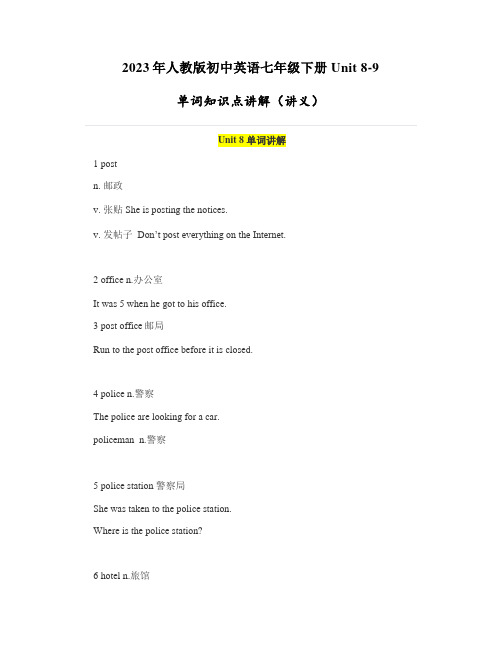
2023年人教版初中英语七年级下册Unit 8-9单词知识点讲解(讲义)Unit 8 单词讲解1 postn. 邮政v. 张贴 She is posting the notices.v. 发帖子Don’t post everything on the Internet.2 office n.办公室It was 5 when he got to his office.3 post office邮局Run to the post office before it is closed.4 police n.警察The police are looking for a car.policeman n.警察5 police station 警察局She was taken to the police station.Where is the police station?6 hotel n.旅馆Did you book a hotel room?7 restaurant n.餐馆We had dinner in a restaurant.The restaurant isn’t far from here.8 bank n.银行Where is the nearest bank?n.岸At the bank of the river, she is doing some washing.9 hospital n.医院He works in a hospital.He spent 2 weeks in hospital.10 street n.大街He lived at 221B Baker Street.11 payv.支付;付费pay (sb.) (for sth.)I’ll pay for the meal.pay 200 yuan a week for the roompay sb. sth.She didn’t pay me the money she owes me. n. 工资;薪水Her job is hard work, but the pay is good. pay the bill 买单12 pay phone 付费电话13 nearadj.附近的His house is very near.In the near future, we’ll be apart.adv. Visitors come from near and far. prep./adv.在..附近Do you live near here?My birthday is near summer vacation.14 acrossadv.从一边到另一边;横过;宽The river is too wide. I can’t swim across. prep.He walked across the field. 他走过田野。
Unit 8--9 基础知识讲解人教版英语九年级全册
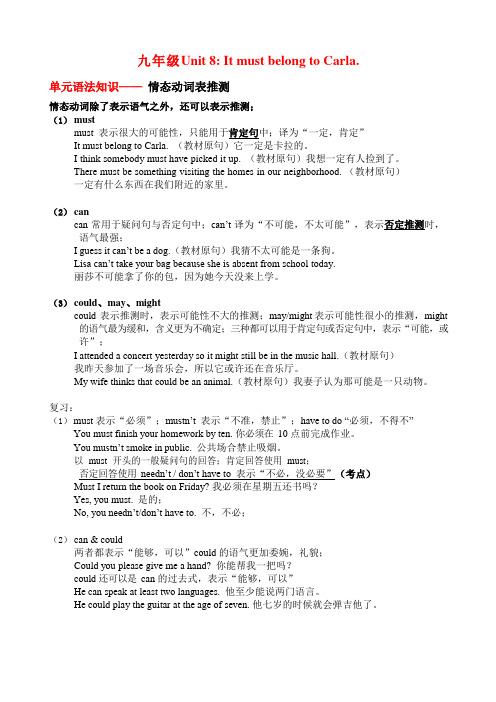
九年级Unit 8: It must belong to Carla.单元语法知识——情态动词表推测情态动词除了表示语气之外,还可以表示推测;(1)mustmust 表示很大的可能性,只能用于肯定句中;译为“一定,肯定”It must belong to Carla.(教材原句)它一定是卡拉的。
I think somebody must have picked it up. (教材原句)我想一定有人捡到了。
There must be something visiting the homes in our neighborhood. (教材原句)一定有什么东西在我们附近的家里。
(2)cancan 常用于疑问句与否定句中;can’t译为“不可能,不太可能”,表示否定推测时,语气最强;I guess it can’t be a dog.(教材原句)我猜不太可能是一条狗。
Lisa can’t take your bag because she is absent from school today.丽莎不可能拿了你的包,因为她今天没来上学。
(3)could、may、mightcould 表示推测时,表示可能性不大的推测;may/might 表示可能性很小的推测,might 的语气最为缓和,含义更为不确定;三种都可以用于肯定句或否定句中,表示“可能,或许”;I attended a concert yesterday so it might still be in the music hall.(教材原句)我昨天参加了一场音乐会,所以它或许还在音乐厅。
My wife thinks that could be an animal.(教材原句)我妻子认为那可能是一只动物。
复习:(1)must 表示“必须”;mustn’t表示“不准,禁止”;have to do “必须,不得不”You must finish your homework by ten. 你必须在10 点前完成作业。
人教七年级上册Unit 8---9要点回顾限时练(word含答案)

Unit 8要点回顾限时练(15分钟)一、根据语境及所给汉语提示,写出所缺短语。
1. -When do you have dinner, Jackie?-___________(在七点)in the evening.2. Bill and his parents will be in Beijing for __________(三个月).3. Ms. White’s tennis game is__________________(在二月十八日).4. Boys and girls always go to school_____________(在九月).5. -Is Teachers' Day _________(在十月)?-No, it isn’t.二、根据汉语意思完成英语句子,每空一词。
1.不要担心,我们在学校过得很愉快。
Don’t worry. We _________ _________ _________ _________at school.2.下个月我们有两场球赛。
We have two_________ _________ _________ _________.3.今天下午他们将举办图书展销会。
They’ll _________ _________ _________ _________ this afternoon. 4.格雷丝,你们的体育节是什么时候?_________ _________ your__________ _________,Grace?5.此刻布什先生就在学校图书馆里。
Now Mr. Bush is _________ _________ _________ _________.三、根据括号内的要求完成下列各题,每空一词。
1. —Is Peter’s ping-pong game in March?(补全肯定答语)-Yes, _________ _________.2. I have breakfast at 6:30 in the morning.(对划线部分提问)_________ _________ you _________ breakfast?3. Mr. Green’s son is six years old.(对划线部分提问)_________ _________ _________ Mr. Gre en’s son?4. My daughter is two. What about your daughter?(改为同义句)My daughter is two. _________ _________ your daughter?四、根据横线后的标点提示,将所给单词连成完整、正确的句子。
useful expression unit8,9

Unit 81. Insinuate:T: One can only gently insinuate something else into its rightly chosen, if it is really attended by the illumination of another field of interest, gradually, and often quite swiftly, the old undue grip relaxes and the process of recuperation and repair, begins.①to suggest indirectly that sth unpleasant is true 暗示,旁敲侧击地指出(不快的事)M:Peter insinuated that his wife was having an affair with his friend.②move slowly into 缓慢进入M:Since being cheated by Peter, a plan of revenge insinuated into her mind.2. Capricious:T: As for the unfortunate people who can command everything they want, who can gratify every caprice and lay their hands on almost every object of desire —for them a new pleasure, a new excitement is only an additional satiation. caprice (n.) capricious (adj.)① showing sudden changes in attitude or behavior (态度或行为)反复无常的;任性的M:It’s generally believed that females are capricious.② changing suddenly and quickly 变化无常的;变幻莫测的M:The weather in Guangzhou is capricious. People always joke that one can experience four seasons in a week in Guangzhou.3. Futile: having no purpose because there is no chance of success 徒然的;徒劳的;无效的T:The stronger the will, the more futile the task.M:Their efforts to cheer him up were futile. He still immerses in the grief of unemployment.4. Satiate:to give sb so much of sth that they do not feel they want anymore 满足T: As for the unfortunate people who can command everything they want, who can gratify every caprice and lay their hands on almost every object of desire —for them a new pleasure, a new excitement is only an additional satiation. satiation (n.) satiate (v.)M: In the party there are enough activities and games to satiate the young people.Unit 91. Ambivalent: ~(about/toward sb/sth) having or showing both good and bad feelings about sb/sth (喜忧参半、好坏参半等)矛盾情绪的T: In easy times we are ambivalent - the leader, after all makes demands,challenges the status quo and shakes things up.M:It has been ten years since they got married. Lily loves her husband so much but recently, her husband had an affair with another woman so Lily was ambivalent about him.2. Stand outT: We expect our leaders to stand out a little, not to be like ordinary man.① stand out (as sth) to be much better or more important than sb/sth 出色;杰出;更为重要M: Compass stands out as being more important than food and tent when you lost in the forest.② stand out (from/against sth) to be easily seen; to be noticeable 显眼;突出M:She’s the sort of person who stands out in a crowd.3. ProjectT: He has to be able to project firmness - no physical clumsiness (like Ford), no rapid eye movements (like Carter).① to plan an activity, a project etc. for a time in a future 规划;计划;拟定方案M: The next edition of the book is projected for publication in March.② to estimate what the size, cost or amount of sth will be in the future 预测;预计;推想M:A growth rate of 7% is projected for next year.to present sb/sth/yourself to other people in a particular way, especially one that gives a good impression 展现;表现;确立(好印象)M: They sought advice on how to project a more positive image of their company.4. Infatuation: ~(with sb/sth) very strong feelings or love or attraction for sb/sth, especially when these are unreasonable and do not last long (尤指一时的)热恋;痴迷T: Television exposed Nixon’s insecurity and Humphrey’s fatal infatuation with his own voice.M: It’s not love, it’s just a passing infatuation.。
人教版七年级下学期英语Unit 8---unit9 单元测试(有答案)

七年级下学期人教版英语Unit 8一、单项选择题:( )1. ________. Where is the park, please?A. HelloB. Excuse meC. SorryD. Hi( ) 2.—Is there a post office on Fifth Avenue?—Yes, ________.A. here isB. they areC. it isD. there is( )3. — ________ is the pay phone?—It’s next to the post office.A. WhenB. WhoC. WhereD. Why( )4. Welcome ________ my birthday party.A. atB. inC. toD. /( )5. —There ________a football match on TV tonight. I can’t wait to watch it.—Me, too. It’s ____ Guangzhou Evergrande and the Australianteam Melbourne Victory.A. will be; betweenB. will be; bothC. will have; betweenD. will have; both( )6. — Excuse me, is there __________ post office near here? —Yeah. It’s just next to ___________ First People’s Hospital.A. a; theB. the; aC. the; theD. /; /( )7. Look! There is a bridge _____ the river.A. betweenB. acrossC. behindD. along( )8. — ______ can I get to the Green Hotel?—Sorry, I’m new here.A. WhatB. WhenC. WhoD. How( )9. — Do you like the Internet?—Yes, I __________ lots of time on it. It’s a good way (方式) to kill time.A. bringB. spendC. payD. take( )10. — How do you get to Beijing?— By _________.A. moneyB. timeC. countryD. air( )11. — Look! An office building (建筑物) is there.— Oh, _____ office building is really new.A. aB. anC. theD. /( )12. — Is there a park _______________ your neighborhood? —Yes. It’s a small park.A. inB. onC. ofD. with( )13. — Excuse me, _________ can I get to the bank?—Sorry, I’m new here.A. whatB. whenC. whoD. how( )14. — Your sweater is so beautiful. How much do you _______ on it?— Seventy dollars.A. payB. takeC. bringD. spend( )15. — Do you want to buy the pet dog?—No, I don’t have _________ to buy it now.A. timeB. moneyC. airD. water二、完形填空:Dear Amanda,How is everything going with you? My birthday is coming. And on 1 evening, I will have a birthday party in my house. I hope (希望) you can come. But it’s 2 easy to find my place, so now I tell you how you can get here.Here is a 3 . It can help you find 4 my house is. Go down Long Street and don’t5 left. Just walk straight (径直地) for around five minutes. You can see a6 stop on your left. You can take the No. 5 bus and get off at the fifth stop. Then you are on New Street. Walk along the street and you can see a7 . And the neighborhood I live in is8 the bank. When you9 the gate (大门) of my neighborhood, please call me.On Friday, the party will start at 6:00 p.m. Many of my friends will come. And you can also 10 your friends here. My mom will make many kinds of delicious food for us. We can sing and dance together (一起). I think we can have a good time that day.Yours,Cassie( )1. A. Saturday B. Sunday C. Friday D. Thursday ( )2. A. very B. much C. not D. many( )3. A. book B. map C. street D. newspaper( )4. A. how B. what C. when D. where( )5. A. meet B. live C. turn D. cross( )6. A. bus B. subway C. train D. bike( )7. A. hotel B. hospital C. bank D. supermarket( )8. A. from B. across C. front D. behind( )9. A. get to B. arrive C. drive D. visit( )10. A. take B. bring C. leave D. let三、阅读理解:AMy name is Dave. On school days, I live in my school. It’s across from a bookstore. And I love my school because I have many friends here and my school life is colorful (多彩的). There is a supermarket near my dormitory (宿舍) and I often buy food and school things in it. Next to the supermarket, there is a fruit store. And I often buy some fruit in it.My name is Johnny. I live with my grandparents in a small village.I like living there because it’s quiet there. There is only one supermarket in the village and there is no bank there. But in the town, there is a bank. When I want to withdraw (提取) some money, I need to go to the town.I am Amber. This is my neighborhood. It’s busy. There are lots of stores and restaurants around here. My house is on a street corner (角落). Near my house, there is a post office. And next to the post office is a pay phone. Also, there is a park in my neighborhood. Many people like to go there to do sports.( )1. Where is Dave’s school?A. It’s on a street corner.B. It’s across from a bookstore.C. It’s behind a supermarket.D. It’s in front of a bank.( )2. The underlined word “there” refers to (指代) ___________.A. Amber’s houseB. the parkC. the post officeD. the street corner( )3. There is only one supermarket in _____ neighborhood.A. Johnny’sB. Dave’sC. Gina’sD. Amber’s( )4. Why does Dave love his school life?A. Because he can have lots of delicious food at school.B. Because he likes his teachers in his school.C. Because there are so many rules at home.D. Because he has many friends and his school life is great. ( )5. What can NOT we know from the passage?A. Dave, Johnny and Amber study in the same school.B. Amber’s neighborhood is very busy.C. There is no bank in Johnny’s village.D. Dave lives in his school on school days.BMr. Brown lives on Green Street now. He wants to send a postcard(寄贺卡) to his pen pal in Toronto, but he doesn’t know where the post office is. “Which is the way to the post office?” he asks his new neighbor Jo e. “I want to send a postcard to Toronto.” “The post office is quite far from here,” answers Joe. “If you only want to post some letters or postcards, you needn’t go to the post office. You can put them into a mailbox down the street.( )6. Where does Mr. Brown live now?A. He lives on Center Street.B. He lives in Toronto.C. He lives on Green Street.D. He lives in a post office. ( )7. Where does Mr. Brown want to go?A. A pen pal’s house.B. A post officeC. A mailbox.D. Toronto.( )8. What does Mr. Brown want to do in the post office?A. He wants to go to the mailbox.B. He wants to buy some stamps.C. He wants to send a postcard.D. He wants to know the way to Toronto.( )9. Where is the post office?A. We don’t know.B. In Toronto.C. On Green Street.D. In the neighborhood. ( )10. Where can Mr. Brown post the postcard in the neighborhood?A. The post office.B. The mailbox in the post office.C. His house.D. The mailbox on the street.四、词汇运用:1. We want to ________________(度过) a happy weekend with them.2. Don’t _________(爬) the tree, Tom.3. I like the clean _________(空气) in the village.4. Mr. Zhao comes from the _________(北部) of China.5. Turn left at the second _________(十字路口) and you will find the hospital.6. I am watching my dog ________ (play) with a ball now.7. Children often enjoy________(play)computer games.8. ________ (take)a bus from Sixth Avenue and go down Bridge Street.9. Walk down New Street and turn left at the first ________ (cross).10. Do you want ________(buy)books?五、按要求完成下列句子:1. There is a post office on New Street. (改为一般疑问句)_______ _______ a post office on New Street?2. Are there two shops near here?(作否定回答)_______, _______ _______.3. Lucy sits on Susan’s left and George’s right. (改为同义句)Lucy sits _______ Susan _______ George.4. My backpack is behind the chair. (改为同义句)The backpack _______ _______ _______ is _______.5. The library is near her house. (就画线部分提问)_______ _______ the library?六、完成句子:1. 这些书你可以带走。
2021--2022学年人教版九年级英语 Unit 8 -9单元单词+短语+句子 测试题(含答案)
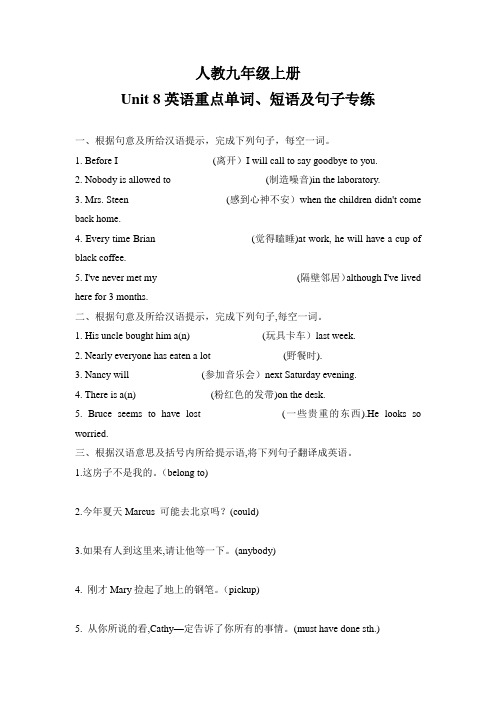
人教九年级上册Unit 8英语重点单词、短语及句子专练一、根据句意及所给汉语提示,完成下列句子,每空一词。
1. Before I_________ _________ (离开)I will call to say goodbye to you.2. Nobody is allowed to_________ _________ (制造噪音)in the laboratory.3. Mrs. Steen _________ _________ (感到心神不安)when the children didn't come back home.4. Every time Brian_________ _________ (觉得瞌睡)at work, he will have a cup of black coffee.5. I've never met my_________ _________ _________(隔壁邻居)although I've lived here for 3 months.二、根据句意及所给汉语提示,完成下列句子,每空一词。
1. His uncle bought him a(n)______________ (玩具卡车)last week.2. Nearly everyone has eaten a lot______________ (野餐时).3. Nancy will______________ (参加音乐会)next Saturday evening.4. There is a(n) ______________ (粉红色的发带)on the desk.5. Bruce seems to have lost ______________ (一些贵重的东西).He looks so worried.三、根据汉语意思及括号内所给提示语,将下列句子翻译成英语。
Unit8知识点人教版九年级英语全册

Unit8 It must belong to Carla.英语教研组词汇精讲1、attendattend用作及物动词,意为“出席;参加”。
指参加会议、婚礼、典礼、葬礼;也指去上课、上学、听报告等。
例:He needs to attend an important meeting. 他需要参加一个重要的会议。
【辨析】join/take part in/attend(1)join指加入某个党派, 团体组织等, 成为其中一员, 意为“参军, 入党, 入团”例:join the Army/the Party/the League (2)join sb. in (doing) sth. 和某人一道做某事例:Will you join us in the picnic? 你参加我们的野炊吗?(3)join in多指参加小规模的活动如“游戏, 比赛”, 口语中常用。
例:Join in the basketball game. 参加篮球赛。
(4)take part in 指参加会议或群众性活动, 着重说明主语参加该项活动并在活动中发挥作用。
例:We’ll take part in the sports meeting/club.(5)take an active part in 积极参加……(6)attend 正式用语vt. 指参加会议, 婚礼, 葬礼, 典礼; 去上课, 上学, 听报告等。
句子主语只是去听, 去看, 自己不一定起积极作用。
例:I attended a night school. 我上夜校。
【即学即练】Would you like to ________ my birthday party this Saturday?—Sorry, I have an important meeting to ________. A.attend; join B.take part in; attend C.join; take part in D.attend; join in2、belong to someone 和be someone’sbelong to someone 和be someone’s 含义基本相同,都表示“属于某人,归某人所有”区别:①belong to +名词或宾格代词。
人教版九年级英语Unit8单词、课文知识梳理,词汇句式精讲
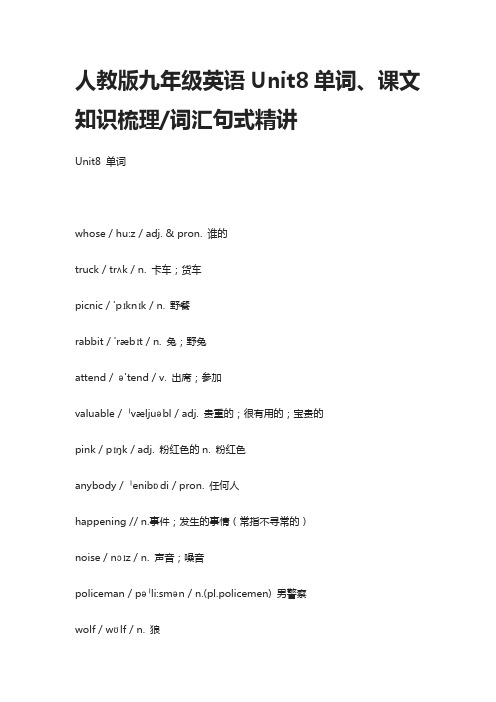
人教版九年级英语Unit8单词、课文知识梳理/词汇句式精讲Unit8 单词whose / hu:z / adj. & pron. 谁的truck / trʌk / n. 卡车;货车picnic / 'pɪknɪk / n. 野餐rabbit / 'ræbɪt / n. 兔;野兔attend / ə'tend / v. 出席;参加valuable / ˈvæljuəbl / adj. 贵重的;很有用的;宝贵的pink / pɪŋk / adj. 粉红色的n. 粉红色anybody / ˈenibɒdi / pron. 任何人happening // n.事件;发生的事情(常指不寻常的)noise / nɔɪz / n. 声音;噪音policeman / pəˈli:smən / n.(pl.policemen) 男警察wolf / wʊlf / n. 狼uneasy / ʌn'i:zɪ/ adj.担心的;不安的laboratory / lə'bɒrətrɪ/ n. 实验室outdoors / ˌaʊtˈdɔ:z / adv.在户外;在野外coat / kəʊt / n. 外套;外衣sleepy / 'sli:pɪ/ adj. 困倦的;瞌睡的land / lænd / v.着陆;降落alien / 'eɪlɪən / n. 外星人run after 追逐;追赶suit / su:t / n. 西服;套装v.适合express / ɪk'spres / v. 表示;表达at the same time 同时;一起circle / 'sɜ:kl / n. 圆圈v. 圈出Britain / ˈbrɪtn / n. (= Great Britain) 大不列颠mystery / ˈmɪstri / n. 奥秘;神秘事物receive / rɪ'si:v / v. 接受;收到historian / hɪˈstɔ:riən / n.历史学家;史学工作者leader / 'li:də(r) / n. 领导;领袖midsummer / ˌmɪd'sʌmə(r) / n.仲夏;中夏medical / ˈmedɪkl / adj. 医疗的;医学的purpose / 'pɜ:pəs / n.目的;目标prevent / prɪ'vent / v. 阻止;阻挠energy / 'enədʒɪ/ n. 精力;力量position / pəˈzɪʃn / n. 位置;地方burial / 'berɪəl / n. 埋葬;安葬honor / 'ɒnə(r) / (= honour) v. 尊重;表示敬意n. 荣幸;荣誉ancestor / 'ænsestə(r) / n. 祖宗;祖先victory / 'vɪktərɪ/ n. 胜利;成功enemy / ˈenəmi / n. 敌人;仇人period / ˈpɪəriəd / n. 一段时间;时期hard-working / hɑ:d 'wɜ:kɪŋ/ adj.工作努力的;辛勤的Stonehenge 巨石阵Unit8 知识梳理【重点短语】1. belong to…属于…...2. toy truck 玩具卡车3. her favorite writer 她最喜爱的作家4. the only little lid唯一的小孩5. listen to pop music听流行音乐6. hair band 发带7. attend a concert 参加音乐会8. in the music hall 在音乐大厅9. something valuable 贵重的东西10.go to a picnic=go for a picnic去野餐11. at the picnic在野餐时12. the rest of my friends 我其余的朋友13. pick it up 捡起,拾起14. each other=one another 互相,彼此15. nothing much没什么(事)16. something unusual不寻常的东西17. something strange奇怪的事18. anything else其它的东西19. be interviewed by…被…采访20. strange noises 奇怪的声音21. outside our window在我们的窗外22. next-door neighbor隔壁邻居23. at first 首先,起初24. run away 逃走25. feel uneasy 感到不安26. have no idea=don’t know 不知道27. go away 走开,离开28. noise-maker 噪音的制造者29. have fun doing sth.做某事开心30. create fear制造恐惧【重点句型】1. If you have any idea where it might be,please call me.如果你知道它可能在哪,请打电话给我。
2021-2022学年人教版七年级上册英语Unit 8 --unit9单元 同步练习 (含答案)

Unit 8 When is your birthday?I. 单项选择。
( ) 1. We have __________ art festival every year. __________ art festival is in December. A. a; An B. an; the C. an; the D. a; The( ) 2. The music festival __________ our school is __________ September 21st.A. with; onB. on; atC. in; onD. under; on( ) 3. __________ is 10 years old. __________ birthday is in December.A. She; SheB. She; HerC. Her; HerD. Her; She( ) 4. --Let’s play tennis in the yard (院子).--Sorry, I have no __________ now. I have to read a __________.A. clothes; movieB. room; bookC. time; bookD. friend; newspaper ( ) 5. October comes before __________ and after __________.A. September; NovemberB. November; SeptemberC. December; NovemberD. September; August( ) 6. --When is your English __________?--__________ next month.A. book; ItB. movie; itsC. party; ItsD. party; It’s ( ) 7. The woman __________ red is __________ aunt.A. of; Mary and JaneB. on; Mary’s and Jane’sC. in; Mary and Jane’sD. in; Mary’s and Jane ( ) 8. September is the __________ month of __________ year.A. eight; aB. nineth; aC. tenth; theD. ninth; a( ) 9. --What should we do now, Mr. Clark?--Please turn to Page __________ and look at the __________ picture.A. Twelve; fifthB. Twelfth; fifthC. Twelve; fiveD. Twelfth; five ( ) 10. --When is _______ mother’s birthday?--It is on __________.A. you; FebruaryB. your; July the fourteenC. your; February 7thD. your; March ninethII. 完成句子: 根据所给汉语意思, 用单词或短语完成下列英文句子。
2023年八年级下册Unit 8-Unit 9单元测试英语题带答案和解析(江西省抚州市临川区)

单选题—Will you go and see the movie Net Mother with me?—Thank you. But I _____it already.A.sawB. have seenC. seeD.will see【答案】B【解析】考查动词时态。
根据标志词already可知,是运用现在完成时态,表示过去发生的动作对现在造成的影响。
单选题I'm expecting a call from my daughter. She________ New York for three days.A.has gone toB.has come inC.has been toD.has been in【答案】D【解析】句意:我期待着我女儿的电话,她去纽约三天了。
考查动词短语辨析。
has gone to去某地了(短暂性动词);has come in进来(短暂性动词,不接时间段);has been to去过某地(以前去过,现在已经回来了);has been in待在某地(是延续性动词,可以接时间段);根据句意可知现在在纽约,for three days三天,需要延续性动词;故选D。
单选题Come to my home and let's have some tea ________ you are free.A.whateverB.wheneverC.whereverD.however【答案】B【解析】句意:无论你什么时候有空都可以来我家让我们喝喝茶。
考查副词辨析。
whatever无论什么;whenever无论何时;wherever 无论哪里;however无论怎样;根据句意可知是“无论你什么时候有空”;故选B。
单选题—The island is very beautiful.—Yes. Every summer ________ visitors come here for their holidays.A.thousandB.thousandsC.thousands ofD.thousand of【答案】C【解析】句意:——这个岛屿非常漂亮。
研究生英语综合教程上 UNIt 8、9、10单元中task 3全文翻译和答案
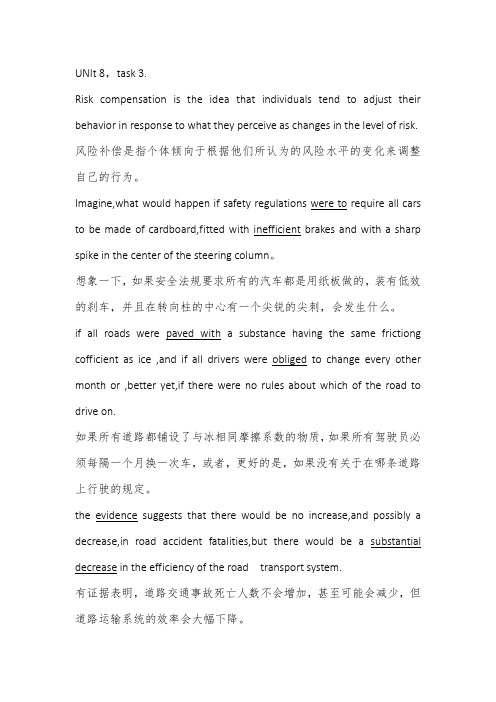
UNIt 8,task 3.Risk compensation is the idea that individuals tend to adjust their behavior in response to what they perceive as changes in the level of risk. 风险补偿是指个体倾向于根据他们所认为的风险水平的变化来调整自己的行为。
Imagine,what would happen if safety regulations were to require all cars to be made of cardboard,fitted with inefficient brakes and with a sharp spike in the center of the steering column。
想象一下,如果安全法规要求所有的汽车都是用纸板做的,装有低效的刹车,并且在转向柱的中心有一个尖锐的尖刺,会发生什么。
if all roads were paved with a substance having the same frictiong cofficient as ice ,and if all drivers were obliged to change every other month or ,better yet,if there were no rules about which of the road to drive on.如果所有道路都铺设了与冰相同摩擦系数的物质,如果所有驾驶员必须每隔一个月换一次车,或者,更好的是,如果没有关于在哪条道路上行驶的规定。
the evidence suggests that there would be no increase,and possibly a decrease,in road accident fatalities,but there would be a substantial decrease in the efficiency of the road transport system.有证据表明,道路交通事故死亡人数不会增加,甚至可能会减少,但道路运输系统的效率会大幅下降。
饭店英语教案unit8、9

Unit Eight At a Chinese RestaurantForewords: Cooking in China has age-long history. What the Chinese eat differs according to region, climate, tradition, wealth andpersonal preference. As a waiter or waitress, you not onlyhave to be professional in your work, but also have to beknowledgeable about Chinese cuisine.1. Warming-up Exercises(1). Passage of page 71(2). Exercise: a. Do you know the meaning of table service? What is the proper way ofoffering table service?b. Do you know the normal service for Chinese banquet?c. Is the menu important? What are some of the factors that affect the menuplanning?d. What are the features of Chinese cuisine?e. How to translate the Chinese dishes into English?f. Can you tell your class how to make your favorite dishes?2. Notes to the Dialogues (P75)3. Dialogues of Teaching Material(Acting and translating)4. Useful Sentence Patterns(1) Asking about the time of a reservationWhen would you like your table?What time would you like your table?When are you coming in on Wednesday evening?For what time?What time would you like to arrive?(2) Giving information about the restaurant hoursI’m sorry. We are not open on Mondays.We are open from 8:00 a.m. until 10:00 p.m.Breakfast from 6:00 to 10:00(3) Seating the guestHow many are there in your party?We have a window table reserved for you.Would you come with me?Would you like to sit at the counter or would you prefer a table in the dinning room?I do apologize for the delay. Your table’s ready now.(4) Asking the guest if he’s ready to orderAre you ready to order?Would you like to order now?May I take your order now?(5) Recommending something to the guestI’d suggest the chef’s delight: sour soup, Sichuan style.May I suggest you try the King Prawn? The chef recommends it.Roast Duck is a specialty here, I should say.Unit Nine At a Western RestaurantForewords: There are mainly five kinds of restaurant services. They are golden service, silver service, plate service, buffet service andtake-away service. The first three kinds of services aresit-down services and a buffet service can be both a sit-downone and a stand-up one. Take-away service is usuallyassociated with snack bars and fast food outlets. In this unit,we are going to learn how to provide good sit-down service.1. Warming-up Exercises(1). Passage of page 81(2). Exercise: a. What do table d’hote and a la carte mean?b. What kind of meal is a coffee shop served?c. What is a light meal?d. Where do hotel guests often eat their heavy meal of the day?e. Where can hotel guests have something for meal except for going to acoffee shop or dinner restaurant?2. Notes to the Dialogues (P84)3. Dialogues of Teaching Material(Acting and translating)4. Useful Sentence Patterns(1) Declining reservationsI’m sorry, there aren’t any tables left for 8:00 p.m., but we can give you a table at 10:30 p.m.I’m sorry. The restaurant if full.I’m sorry, sir. I’m afraid we’re fully booked for that time.(2) Telling the guest something unavailableI’m sorry, there are no chops left.I’m sorry. We haven’t got any more lobster today. Maybe you would like to have it tomorrow.I’m afraid that this vegetable is not in season. Would you like to try something else?(3) Asking the guest what he’d like to haveWhat would you like?Would you like care for a drink before dinner?What would you like as a starter?What kind of drink would you like?(4) Explaining a dishIt is lamb cooked with herbs and served with spaghetti.It is veal breaded and deep fried to golden brown and served with cream gravy.(5) Setting the billWe can charge it to your room.You can pay with traveler’s checks.You can sign for the drinks you’ve ordered.You need put your address on the back of the check, please.Could you sign here, please?。
新目标婪语八年级(下)Unit8-Unit9知识要点精讲
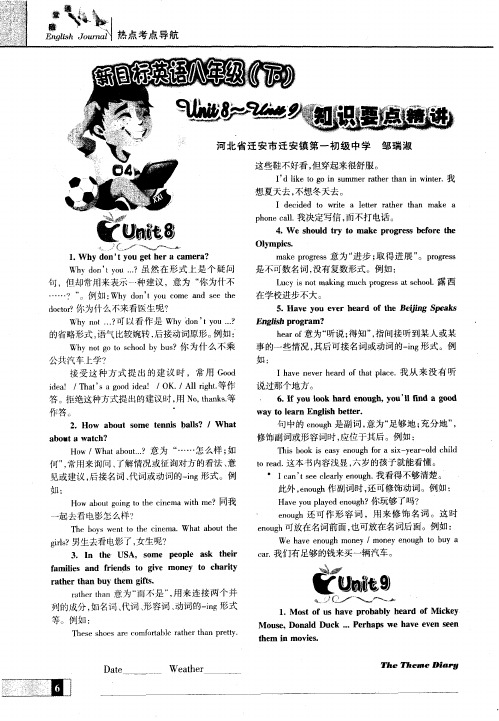
H w aot 0n ec e awt m ?同我 o b u gi t t i m i e g oh n h
一
起 去 看 电 影怎 么样 ?
H w/ a ao t ?意 为 “ o Wh t b u… ……怎么样 ; 如
何” 常用来询问 、 , 了解情况或征询对方 的看法 、 意 见或建议 , 后接名词 、 代词或动词的一n ig形式 。例
如:
t ra . o ed 这本 书 内容 浅显 , 岁 的孩 子 就 能看 懂 。 六
a ta t hn意为“ h 而不是 ” 用来连接两 个并 ,
列的成分 , 如名词 、 代词 、 形容词 、 动词的一n ig形式
等。例如 :
e厂 \
—\ 一
1 .M o tofUS ha r abl ar o i k y s ve p ob y he d f M c e
5 Ha ey u ee er f h e igS ek . v o v rha do eB On p a s t
En l h p o r m? gi r g a s
Wh 0 ’ vI ?虽 然在 形式上 是个 疑 问 vdn t o 1… 句 ,但却常用来表示 一种建议 ,意为 “ 为什不 你
… …
?” 。例 如 : ydntyucm n e h Wh o ’ o o ea d sete
dc r 你为什么不来看医生呢? ot ? o Wh 0 …? 以 看 作 是 Wh o ’ yu…? vn l 可 ydn t o
的省略形式 , 语气 比较婉转 , 后接动词原形。 例如 :
人教版八年级上册英语Unit 8-9 作业
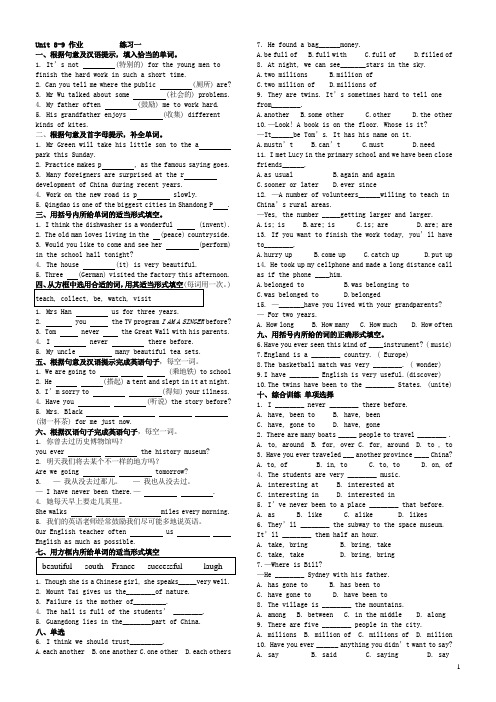
Unit 8-9 作业练习一一、根据句意及汉语提示,填入恰当的单词。
1. It’s not (特别的) for the young men to finish the hard work in such a short time.2. Can you tell me where the public (厕所) are?3. Mr Wu talked about some (社会的) problems.4. My father often (鼓励) me to work hard.5. His grandfather enjoys (收集) different kinds of kites.二、根据句意及首字母提示,补全单词。
1. Mr Green will take his little son to the apark this Sunday.2. Practice makes p , as the famous saying goes.3. Many foreigners are surprised at the r development of China during recent years.4. Work on the new road is p slowly.5. Qingdao is one of the biggest cities in Shandong P .三、用括号内所给单词的适当形式填空。
1. I think the dishwasher is a wonderful (invent).2. The old man loves living in the (peace) countryside.3. Would you like to come and see her (perform) in the school hall tonight?4. The house (it) is very beautiful.5. Three (German) visited the factory this afternoon.)1. Mrs Han us for three years.2. you the TV program I AM A SINGER before?3. Tom never the Great Wall with his parents.4. I never there before.5. My uncle many beautiful tea sets.五、根据句意及汉语提示完成英语句子,每空一词。
人教版九年级英语unit8知识点

人教版九年级英语unit8知识点(经典版)编制人:__________________审核人:__________________审批人:__________________编制单位:__________________编制时间:____年____月____日序言下载提示:该文档是本店铺精心编制而成的,希望大家下载后,能够帮助大家解决实际问题。
文档下载后可定制修改,请根据实际需要进行调整和使用,谢谢!并且,本店铺为大家提供各种类型的经典范文,如演讲稿、总结报告、合同协议、方案大全、工作计划、学习计划、条据书信、致辞讲话、教学资料、作文大全、其他范文等等,想了解不同范文格式和写法,敬请关注!Download tips: This document is carefully compiled by this editor. I hope that after you download it, it can help you solve practical problems. The document can be customized and modified after downloading, please adjust and use it according to actual needs, thank you!In addition, this shop provides you with various types of classic sample essays, such as speech drafts, summary reports, contract agreements, project plans, work plans, study plans, letter letters, speeches, teaching materials, essays, other sample essays, etc. Want to know the format and writing of different sample essays, so stay tuned!人教版九年级英语unit8知识点英语应该是长期坚持的结果,每天要保证有最少半个小时的学习时间,不管是读还是写。
七年级上册人教版unit8 unit9 单词

• Thursday [θə:zdi] n.星期四 • Sunday [sʌndi] n.星期日 • A.M. (=a.m.)上午 • P.M. (=p.m.)下午,午后 • useful [ju:zful] adj.有用的;有益的 • from [frɔm] prep.从…开始 • from...to... 从…到… • Mrs. 太太;夫人 • finish [finiʃ] v.完成;做好 • lesson [lesn] n.课;一节课 • hour [auə] n.小时
• busy [bizi] adj.忙碌的;无暇的 • time [taim] n.时间 • Have a good time! (表示祝愿)过得愉快! • there [ðɛə] adv.(favorite [feivərit] adj.n.(=favourite)特别 喜爱的(人或事物)
• test [test] n.测验;检查 • trip [trip] n.旅游;旅行 • art [ɑ:t] n.艺术;美术 • festival [festəvəl] n.(音乐、戏剧等的)会
演节;节日
• dear [diə] adj.亲爱的 • student [stju:dənt] n.学生 • thing [θiŋ] n.东西;事情 • term [tə:m] n.学期
• geography [dʒiɔgrəfi] n.地理(学)
• history [histəri] n.历史 • why [wai] adv.为什么 • because [bikɔz] conj.因为 • Monday [mʌndi] n.星期一 • Friday [fraidi] n.星期五 • Saturday [sætədi] n.星期六 • for sure 无疑;肯定 • free [fri:] adj.空闲的 • cool [ku:l] adj.妙极的;酷的 • Tuesday [tju:zdi] n.星期二 • Wednesday [wenzdi] n.星期三
研究生英语高级教程unit8-9-11
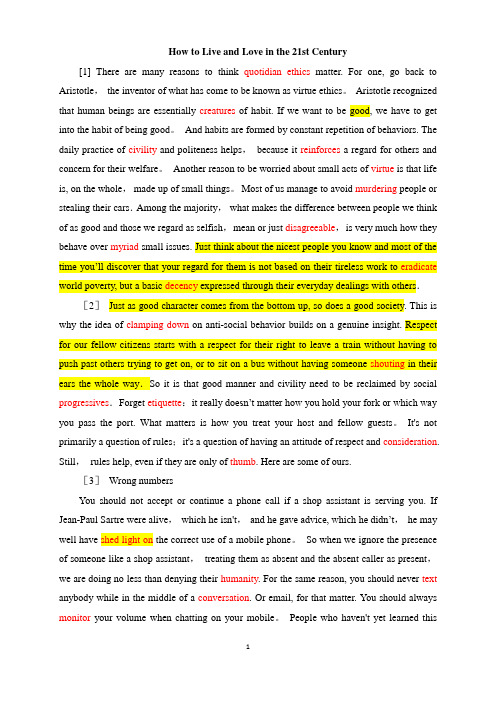
How to Live and Love in the 21st Century[1] There are many reasons to think quotidian ethics matter. For one, go back to Aristotle,the inventor of what has come to be known as virtue ethics。
Aristotle recognized that human beings are essentially creatures of habit. If we want to be good, we have to get into the habit of being good。
And habits are formed by constant repetition of behaviors. The daily practice of civility and politeness helps,because it reinforces a regard for others and concern for their welfare。
Another reason to be worried about small acts of virtue is that life is, on the whole,made up of small things。
Most of us manage to avoid murdering people or stealing their cars.Among the majority,what makes the difference between people we think of as good and those we regard as selfish,mean or just disagreeable,is very much how they behave over myriad small issues. Just think about the nicest people you know and most of the time you’ll discover that your regard for them is not based on their tireless work to eradicate world poverty, but a basic decency expressed through their everyday dealings with others.[2]Just as good character comes from the bottom up, so does a good society. This is why the idea of clamping down on anti-social behavior builds on a genuine insight. Respect for our fellow citizens starts with a respect for their right to leave a train without having to push past others trying to get on, or to sit on a bus without having someone shouting in their ears the whole way.So it is that good manner and civility need to be reclaimed by social progressives.Forget etiquette:it really doesn’t matter how you hold your fork or which way you pass the port. What matters is how you treat your host and fellow guests。
